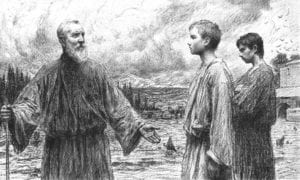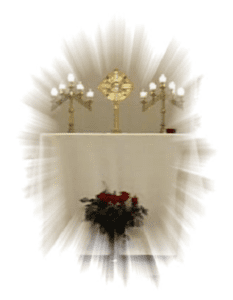
Two Sons
“The Parable of the Two Sons” has different translations. Tradition A is used by major Bible translations wherein it was the first son who initially gave a verbal refusal to go to the vineyard but later on went. The second son consented to go but did not. The first son is identified as the one who did the father’s will. Tradition B reverses the order of the sons. Thus, the first son consented to go but did not, and the second son said he would not go but ultimately did. The second son is then identified as the one who did the father’s will. Our English bible resource uses Tradition A, while our Chinese bible resource uses Tradition B. Hence, the English text in this presentation is not a direct translation of the Chinese text, and vice-versa.
Jesus told the parable of the two sons to the chief priests and the elders of the people. When the father told the first son to go work in the vineyard that day, the son replied “I will not”, but later on, he repented and did as his father asked. The father went to the second son with the same order, and the son replied “Yes, sir”, but he did not do as his father asked.
The first son represented the tax collectors and prostitutes – the religious outcasts who initially did not promise to do the will of God, but later on were brought to repentance by the preaching of John the Baptist and of Christ. As a result, they changed their lives and did what God wanted – they lived righteously. On the other hand, the second son represented the chief priests and elders of the people – the religious leaders who gave God lip service, but their subsequent actions revealed their empty words. They did not do what God wanted – they did not repent of their pride, hypocrisy and unbelief.
When Jesus asked the chief priests, and the elders, which son did his father’s will, they replied “the first”! Indeed, it was the first son who did his father’s will by actually going to work in the vineyard. Even though the second son said “yes” to his father, he did not do his father’s will simply because he didn’t do what his father wanted. If we look at this parable at a deeper level, we will find that repentance is at the heart of this parable. The first son, although he did not do the will of his father at first by saying “no”, later on did the will of his father by repenting and going to work in the vineyard. In the same way, it is the Father’s will that every sinner who said “no” to him, will later on repent and live righteously.
Chapter 18 of Ezekiel addresses the proverb: “Parents eat sour grapes, but the children’s teeth are set on edge.” It was believed that punishment for sins was transferred from one generation to the next, but this chapter emphasizes that “only the one who sins shall die!” (Ezekiel 18:4) Persons have individual responsibility and accountability for the sins they commit, and that is why this chapter encourages individual repentance: “When the just turn away from justice to do evil and die, on account of the evil they did they must die. If the wicked turn from the wickedness they did and do what is right and just, they save their lives; since they turned away from all the sins they committed, they shall live; they shall not die.” (Ezekiel 18:27-28) Persons who previously lived wicked lives, but repent of their sins, no matter how late in life, have the promise of eternal life. A great example is the penitent thief to whom Jesus said: “Amen, I say to you, today you will be with me in Paradise.” (Luke 23:43)

Bible study will resume in October. Bible study in Chinese meets every Wednesday and will resume on Wednesday, October 7 at 10:00 am. Bible study in English meets on the first and third Mondays every month and will resume on Monday, October 5 at 6:30 pm. All participants are required to wear masks and observe social distancing. The social hall has been reserved for bible study during these times.

Eucharistic Adoration has resumed on its regular schedule every Sunday beginning at 9:30 am in the chapel. Come and join us!

Faith Formation has gone online! Online classes for children, teens and adults are now posted in our church website. Lessons will continue to be added, so check our website frequently.

If you have used ink cartridges, don’t throw them away! Please bring them to the church office. Every ink cartridge we recycle gives us $2 off for our next ink purchase. Any size ink cartridge is accepted.